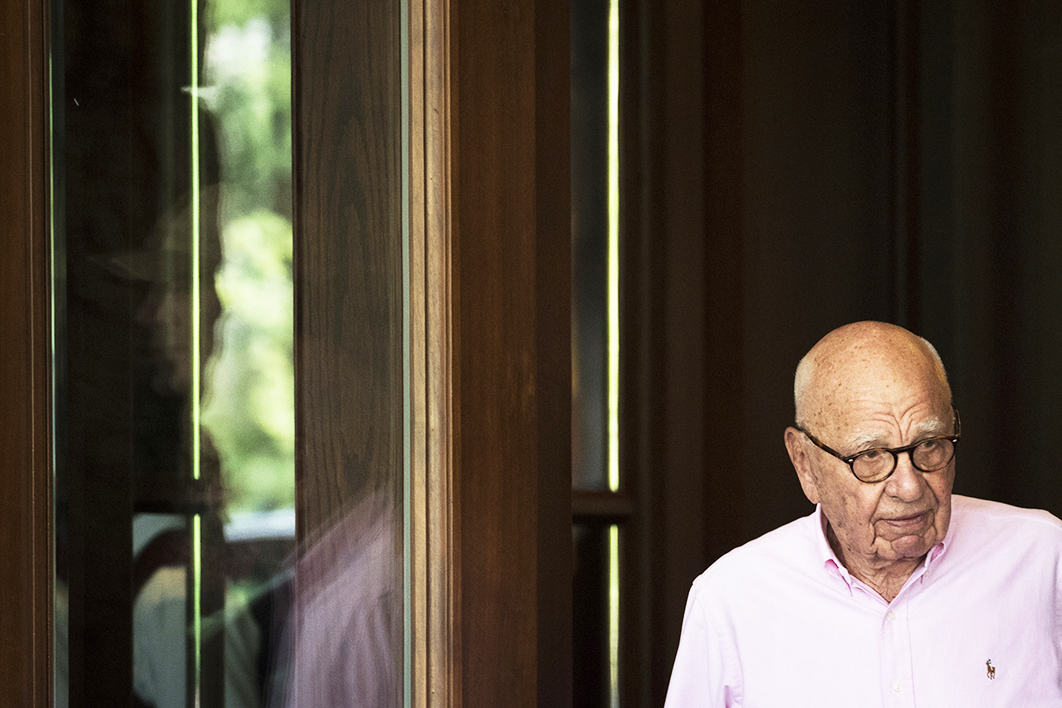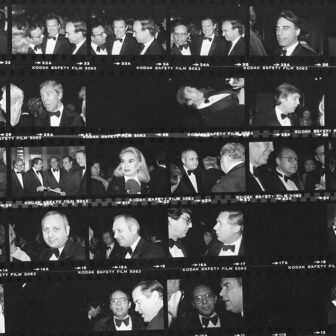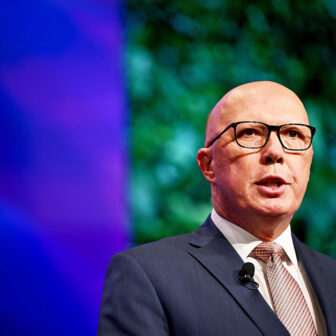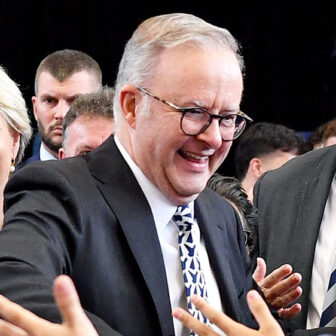Is it a test of patriotism that whenever Americans write about Australia they must get simple things wrong? For the New York Times’s 20,000-word investigation of Rupert Murdoch, “Planet Fox,” journalists Jonathan Mahler and Jim Rutenberg spent six months speaking to more than 150 people across three continents. They make several important revelations, but on matters Australian they make some basic mistakes.
The most puzzling error is their wildly inflated sense of the importance of Murdoch’s Sky News. According to the Times, “the country’s dominant broadcaster was [previously] the Australian Broadcasting Corporation” (there’s no mention of the commercial networks). But since Murdoch became sole owner of Sky News, its “new prime-time line-up of hard-right opinion hosts” means its evening ratings have “spiked.” This might be true, if they mean a spike from negligible to minuscule. Meanwhile, at least ten times as many people watch ABC1’s evening news, and even the specialist ABC News channel averages about double Sky News’s ratings.
Equally puzzling is the claim that Sky News has “become required viewing for the political class” and “the network of choice in the capital, Canberra.” Now, I know some of us make fun of Canberra, but not even I think the inmates of our national capital have so few choices that they spend their evenings watching Sky News. The network’s evening output might be an example of Murdoch’s political biases and poor editorial standards, but is hardly evidence of his success or power.
(Mahler and Rutenberg also refer to Sky News’s recent decision to allow a selection of its programs to be broadcast by the WIN network, which covers twenty-nine regional markets, as “a deal to expand its reach into the Australian Outback — demographically speaking, the equivalent of Trump country.” Residents of Bathurst or Bicheno might be surprised to find themselves in the outback, and the Trump comparison isn’t at all illuminating.)
The Times’s coverage of Murdoch’s role in the fall of Malcolm Turnbull is also misleading. Because Rupert and Lachlan Murdoch had been in Australia during the ten days leading up to his replacement, some people, including some Turnbull supporters, have cast them as central to events. The Times article says that Lachlan, over drinks one night, asked his editors whether Malcolm was going to survive, and made it clear that he would like to see him rolled. “In the days that followed,” write Mahler and Rutenberg, “Sky Australia’s hosts and the Murdoch papers… set about trying to throw Turnbull out of office.”
This account is different from the previously reported version, which had Murdoch senior telling his worried fellow-mogul Kerry Stokes — who thought an overthrowing of Turnbull would lead to a Labor victory — that “Malcolm’s got to go.” It is commonly believed that this account, which Lachlan has denied, was based on sources close to Stokes and had been leaked by the Turnbull camp.
The Times’s Lachlan-centred version is new and interesting, but has its own problems — not least the fact that the primary proponents of Turnbull’s demise were figures inside the Liberal Party affronted by his efforts to introduce an energy policy that paid attention to emissions reduction. After the third version of his National Energy Guarantee was passed, amid acrimony, in the party room, several MPs threatened to cross the floor. Turnbull abjectly surrendered to them. The crescendo of criticisms and threats was certainly given prominent treatment in the media, but it was conservative Liberals who dragged Turnbull down, as they had always hoped to do. In the event, it was Scott Morrison rather than their own candidate, Peter Dutton, who walked away with the prize.
The second problem with treating Lachlan’s edict as central is that many commentators and journalists were already gunning for Turnbull. The Times names Alan Jones, Andrew Bolt and Peta Credlin, but what they and other critics of Turnbull have in common is that they had been criticising him constantly over the previous couple of years without any orders from Lachlan.
Mahler and Rutenberg also try to explain why Murdoch was anti-Turnbull. They speculate that it was because Turnbull had expedited the construction of the NBN, “which directly threatened the family’s highly profitable cable business by giving Netflix a government-subsidised pipeline into Australian homes.” Former prime minister Kevin Rudd and other Labor figures have already used the NBN to explain why Murdoch was against them in 2013, whereas Turnbull’s performance — delivering an inferior product to Labor’s promised network — had hardly delighted NBN advocates. Murdoch’s anti-Turnbull views are much more tribal than commercial.
More broadly, the two journalists also fail to consider the limits of the Murdoch family’s power. In discussing the 1980 presidential election, for instance, they report that members of Ronald Reagan’s team credited Murdoch and the New York Post with delivering New York state in 1980. They don’t mention that the Democrats won the state in every presidential election between 1988 and 2016 despite the Post’s vociferous support for the Republican contenders.
Finally, when the article outlines Lachlan’s closeness to Tony Abbott, and the fact that Abbott, as prime minister, “would discuss legislation with the Murdochs’ editors — and occasionally with the Murdochs themselves — before introducing it,” it makes no mention of how the Abbott government lost support more quickly than any other first-term government in postwar Australian history, or how he was ignominiously thrown out by his own colleagues despite this chumminess with the Murdochs.
These lapses reflect two common traits of journalists: they make causality much too concrete, and they make their main character the centre of events. The key here is not some last-minute intervention by the boss (or the boss’s son) but rather an editorial ethos pervaded by personal links with and support for the far right of the Liberals, which had thrived in Murdoch’s media for years.
But the New York Times investigation also makes several important contributions to our knowledge of Rupert Murdoch and his empire, especially as it has evolved over the past two years. For the first time, it reveals the seriousness of his fall on Lachlan’s yacht in January 2018. Vertebrae were broken, which required immediate surgery, and a spinal hematoma was present. The risk of paralysis or even death was so great that his wife, Jerry Hall, called his adult children, urging them to come to the Los Angeles hospital “prepared to make peace with their father.” Eventually, it seems, Rupert made a full recovery.
The article makes clear for the first time that it was Rupert’s decision to approach the Walt Disney Company’s chief executive, Robert Iger, with an offer to sell the bulk of 21st Century Fox. It is well known that James Murdoch supported this move from the beginning, probably both as a recognition of the Murdoch empire’s increasing commercial vulnerability and as his own possible future route out of the family company. We also knew that Lachlan was against the move, but the article reveals the full strength of his feelings. “If you take one more call on this deal, you will not have a son! I will never talk to you again,” he is quoted as telling his father, though he eventually submitted to the deal’s inevitability.
According to Mahler and Rutenberg, Murdoch initiated talks with Iger in August 2017. The timing is interesting: this was just two months after Ofcom recommended that 21st Century Fox’s attempt to take over the remaining 60 per cent of Britain’s Sky TV service should be reviewed by the Competition and Markets Authority.
A full takeover of Sky was pivotal to 21st Century Fox’s capacity to survive as an independent force in the digital era. In 2011, it seemed on the verge of success when the News of the World phone-hacking scandal erupted, and it had to ignominiously withdraw under attack from all sides of politics. In 2017, led by James, it tried again. Using “a campaign of contrition and humility,” it professed aspirations to be a better company. It took Fox News UK off air because of the criticism it was attracting. Then a new sexual harassment scandal broke out at US Fox News that resulted in the departure of one of its stars, Bill O’Reilly. Moreover, many people in Britain had not forgotten the hacking scandal. As one questioner said to James, “People just don’t trust you.”
Rupert could probably see the signs. Instead of waiting for the Competition and Markets Authority to make its decision, he approached Disney. Four months later, in January 2018, the Authority ruled against Murdoch’s acquisition of Sky, and went as far as to say that no member of the Murdoch family should ever be allowed to serve in any capacity at the broadcaster.
By this time, Murdoch and Iger had already shaken hands on a preliminary agreement to sell most of 21st Century Fox to Disney for US$52.4 billion. After Comcast joined the bidding, Murdoch was able to leverage the final price up to US$71.3 billion, much of it in the form of Disney shares.
Mahler and Rutenberg see the sale as “in a sense an admission of defeat. Murdoch’s ambitions had been subverted, finally and definitively, by his own failings — the family squabbles, the reactionary drift of Fox News, the Sky News debacle.” But Rupert is more likely to see it as securing the best possible outcome in the emerging digital environment.
Rupert has secured a fortune for his family and shareholders, and what they no doubt hope will be a continuing income stream from Disney shares. Two Murdoch family–controlled corporations remain: News Corp, which principally owns newspapers in Britain, the United States and Australia, along with Foxtel and several other Australian assets; and the rump of 21st Century Fox, consisting principally of Fox News and the Fox free-to-air TV network, which are held by a new company called Fox. Despite their fierce disagreement on other matters, James and Lachlan agree on the decidedly limited prospects of the new company. “Why the [expletive] would I want to run this company?” was Lachlan’s rhetorical question to people close to him. James dismissed the new Fox company as “an American political project,” more important to Rupert’s political causes than to the company’s bottom line.
The Times article gives seemingly well-based and penetrating insights into the fraught family relationships. Most importantly it charts the deterioration of relations between Lachlan and James, heightened by clashes over corporate strategy and contrasting views of the Trump presidency and Fox News. James left the company in late 2018, Mahler and Rutenberg report. By then, “he and his brother were barely on speaking terms.”
The article reveals that James proposed and his sisters agreed to sell their stock in the company to Rupert and Lachlan. Rupert was keen, but Lachlan decided it was not financially doable. This probably reflected an accurate view of the company’s prospects.
Now Lachlan is and will be in charge. The article provides abundant evidence that he broadly shares Rupert’s extreme right-wing political views. This implies there will be no significant change of editorial direction at Fox News, certainly not while Trump is president. While Rupert is alive, it probably also guarantees there will be few further closures or sales of assets. It seems clear that the value of several newspapers to Rupert — the Australian, the New York Post and the London Times — is more political than commercial; even the medium-term survival in print of the tabloids cannot be guaranteed. Murdoch, the great empire builder, will now go down in history as owning the greatest loss-making newspapers in history.
While the New York Times account explores the family relationships that resulted in Lachlan’s dominance, it doesn’t reflect on the anachronistic nature of that triumph. Lachlan’s is largely a record of mediocrity and failure: the expensive failure of Super League in Australia; the failure of his involvement in the One-Tel mobile telephone venture; his pedestrian yet smug record at the Ten Network, which ended when CBS bought it from under his nose. If his name were Lachlan Smith, there is no way he would be in his present position.
Rupert Murdoch has always had a feudal view of his giant corporation, many times preferring genes over genius in his personnel decisions. It will be interesting to see where the corporate empire that Rupert built, and has now partially and profitably sold, will be in a decade’s time. •





